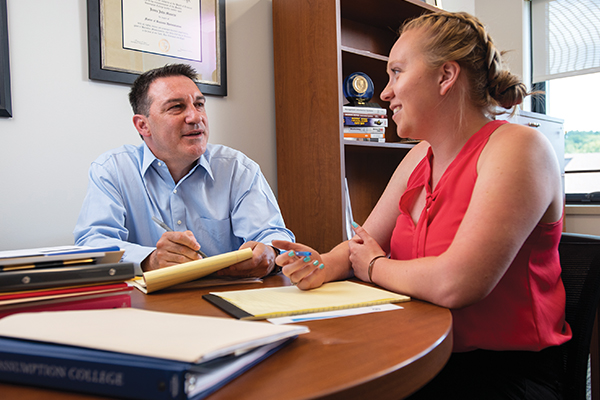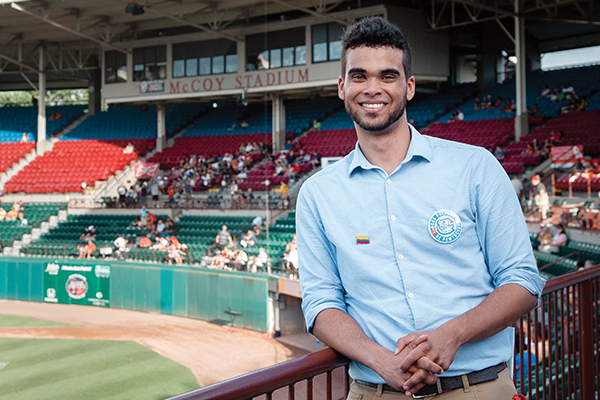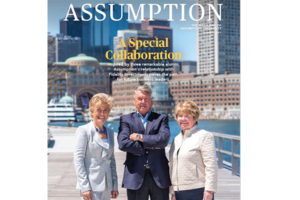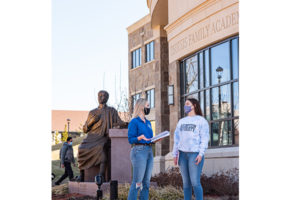Students gain deep knowledge and relevant skills – the essential traits of a professional – through Assumption’s ever-expanding internship and experiential learning programs.

By the time James Landry ’19 applied for an internship in his junior year, he had already earned relevant experience through his project-based Public Relations class and a leadership position with Assumption’s Reach Out Center and Habitat for Humanity chapter.
“You could see people’s eyes light up during job interviews whenever I described the projects I’d already done,” he said.
After taking management, accounting, and marketing classes, Landry chose to major in marketing with a minor in political science. “Marketing is a very creative field,” he said, “but it’s also surprisingly technical. It’s an interesting combination of right brain-left brain work. Plus, I love to travel and meet new people.”
Landry received several internship offers and ultimately chose to work with RCS Learning Center, a nonprofit organization that provides educational services to children with autism spectrum disorders or other development disabilities.
“I thought it would be rewarding to provide marketing services for them, and I knew they had plenty for me to do,” he said.
He was right, but there was one unexpected obstacle: “They didn’t have a place for me to sit,” he said. “I had to float around to different people’s desks, and it was my first lesson in how to adjust and think on my feet.”
As Landry learned through his Internship in Business course, it’s essential to be a “quick-change artist” if you’re going to succeed professionally. “That means learning how to think quickly and adapt to different situations,” he explained. Ultimately, his internship supervisors complimented his flexibility and cheerful willingness to do whatever was necessary to get the job done.
The Internship in Business class is one component of the Experiential Learning program in Assumption’s Business Studies Department. Open to juniors and seniors with a GPA of 2.8 or higher, students spend 120 hours a semester applying the skills they’ve learned in class out in the field while attending regular seminars.
“I loved hearing the perspectives of other students doing internships,” said marketing major Alyssa Jalbert ’19. “It was a great way to learn what jobs are out there and what skills they require.”
Jalbert interned for the institution’s Institutional Advancement Office, assisting in alumni relations during her sophomore year, and applied for an internship at Worcester Envelope as a junior. The company called her back the next day. Once hired, she did everything from market research to writing content for a new website and managing an email campaign. Her supervisor was so impressed that he hired her to stay on for the summer.
“Internships have been an essential part of my education,” Jalbert said. “Before that, I had studied marketing in the classroom, but I didn’t really know what goes on day to day on the job.”
Landry agreed. “You can learn a lot in class, but you still don’t know what it’s like to actually get up in the morning, dress professionally, go into an office, and work effectively with coworkers and clients,” he said. “You don’t realize that you need to go out and see the world until you actually go out and see the world.”

How to succeed in business? Learn to be comfortable with the uncomfortable
When Jean-Manuel Martinez ’18, an international business major with a sport management minor, landed an internship with the Red Sox Foundation the summer after sophomore year, he was stepping out of his comfort zone – or maybe even leaping.
“I was definitely an introvert,” he admitted. “This was a job where you had to interact with hundreds of fans every day. It was really scary. I had to learn to be comfortable with the uncomfortable.”
Born in New York, Martinez grew up in the Dominican Republic and arrived at Assumption with dreams of one day becoming the general manager of a sports team. He majored in international business to better prepare him for future work in a bilingual, bicultural setting, like many professional baseball clubhouses.
When Assistant Professor of Management Libby O’Hara discovered his passion for baseball, she encouraged Martinez to add a sport management minor. She also nudged him to attend the campus events she arranged with guest speakers from the Red Sox, Celtics, and New England Patriots, among others.
“I learned a lot by listening to these people talk about their personal experiences and how they got to where they are today,” Martinez said, “and I’m so grateful that Professor O’Hara kept pushing me to go and then follow up on these events by emailing the speakers and asking about volunteer work and internship opportunities.”
During his junior year, Martinez interned with the New England Baseball Complex, and in the spring he interviewed with the Pawtucket Red Sox, where he was offered a summer position as a community relations intern the same day.
“It was crazy,” he marveled. “I was stunned.” This position, too, required Martinez to tackle a wide range of responsibilities. He was hired by the team’s community relations office after graduation and put in charge of Osos Polares, a new initiative the organization has developed with the Latino community.
“It’s a great project and really fun to do,” Martinez said, “because it’s a way for me to expose our current fan base to Latin American culture and draw more Latino fans to the games.”
In no small way, Martinez has achieved his dream of working in business in a bilingual, bicultural setting. He attributes his success to both the experiential education he received at Assumption and to the one-on-one mentoring he received from Prof. O’Hara.
For students with big dreams, he offers this advice: “There are certain things you can learn by working that you just can’t learn in a classroom. The earlier you can do internships, the better,” he said, “and then network, network, network. It’s great to have a high GPA, but the more you have on your resume at the end of four years of college, the more you’ll stand out from other job candidates.”
Practicing Knowledge
Like Martinez, Marisa DeLuco ’19, a business communications major with a sport management minor, developed a passion for sports early on. She worked as a team manager throughout high school, hoping to one day make it her career.
At Assumption, the projects she has completed in her marketing and organizational communication classes have prepared her well for that role. “I’ve done so many marketing plans and sales analyses that I can do them off the top of my head now,” she said.
This summer, DeLuco was a travel intern in Connecticut with a U-19 team for American Legion Baseball, an umbrella organization for 3,500 baseball teams in the U.S. and Canada. Her responsibilities included following the team, recording players’ statistics, and uploading them to the team’s website for public access. “Sitting in the dugout with the team, I don’t just watch them play,” she said. “I also see what the head coach does and how the team is managed. Those are things I couldn’t have learned in a classroom. Internships are a great way to learn through experience.”
Fortunately, business studies students have multiple avenues for learning through experience. Experiential Learning Coordinator James Monette, M.B.A. ’08 oversees all aspects of experiential learning for the department, from maintaining relationships with organizations for projects and internships to working with students on career-related tasks such as interview skills and building portfolios.
Monette, who spent two decades in banking and finance prior to assuming the newly created position in 2016, said that businesses are eager to work with Assumption students. “The institution has a stellar reputation in the business community,” he said, adding that the Experiential Learning program supports the institution’s mission of being a liberal arts institution whose graduates are known for their critical intelligence, thoughtful leadership, compassionate service, and ethical leadership.
Besides the Internship in Business class, the institution offers experiential learning opportunities through a Sport Internship course and class projects. Additionally, through Community Service Learning (CSL) classes, students apply concepts and theories to help people and organizations in need. For instance, Jennifer Niece, C.P.A., chair of the Business Studies Department and associate professor of accounting, oversees the Community Tax Assistance course, in which students electronically prepare tax returns for low-income taxpayers. Moreover, those in the Global Social Entrepreneurship class learn about establishing and implementing business opportunities in developing countries.
“Our faculty all came out of industry,” said Prof. Niece, “and we bring our ties to the business world into the classroom. Because we identify ourselves as practitioner-scholars, we stay in tune with what’s trending in the marketplace.”
Assistant Professor of Marketing & Organizational Communication Arlene DeWitt, M.B.A., noted that, no matter what concentration students choose, having a liberal arts degree is a bonus because Assumption graduates possess the one skill employers prize most: the ability to communicate effectively.
“Employers can train people on the job,” she said, “but only if those people already have good communication and teamwork skills, know how to manage their time, and are able to analyze problems and create solutions. Our students have those skills.”
Not all knowledge is created equal
“Knowledge” is something we think of as learned through classes and textbooks, but that’s not always true. Some of the most important knowledge essential for individual success in the business world is “tacit knowledge” – or the ability to think and act as a professional. These skills can only be learned “by working alongside seasoned professionals” in internships, explained Prof. DeWitt, who conducts research in this area.
Tacit knowledge skills are in top demand in our global, multicultural, fast-paced, high-tech business world. One of those skills is being a “quick-change artist” – someone who adapts well to unexpected situations on the job, as Landry did.
Other examples include thinking of oneself as a “service center,” learning how to improve situations at work so that you are perceived as a “fixer” rather than a “finger pointer,” and developing networking skills.
Interns in Prof. DeWitt’s weekly seminar course apply organizational behavior and management concepts, such as company culture, leadership styles, and communication channels, to their internships by conducting a “macro” analysis of these concepts in their companies and a “micro” analysis of their personal fit within their companies. In this way, students access their own work preferences and thus are able to make sound career decisions when they graduate.
What’s more, she requires students to conduct informational interviews, preferably “in companies they dream about working for one day or in career fields that interest them,” she said, “because this helps them refine their communication skills and learn how to assess the structure and leadership style of different companies.”
Informational interviews also help students acquire networking skills and can even open doors, as when Landry interviewed a marketing director at Nova Biomedical in Waltham. The marketing director encouraged Landry to apply for a summer internship on the spot, where his responsibilities have included email marketing and assembling client materials for seminars.
“It’s definitely rewarding,” said Landry, who spent the summer as their marketing intern. “I’m doing everything a marketing professional in this job would be doing, and I love it. If I hadn’t gone to Assumption, I wouldn’t be where I am.”


